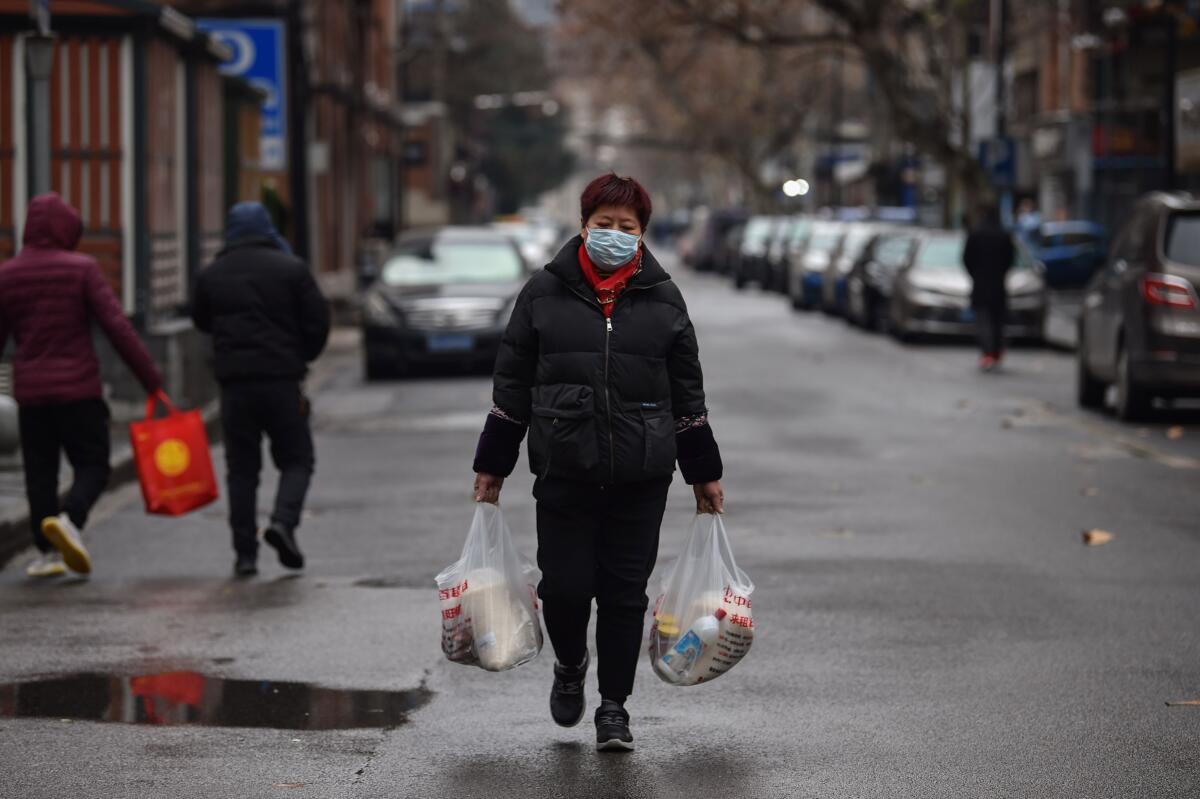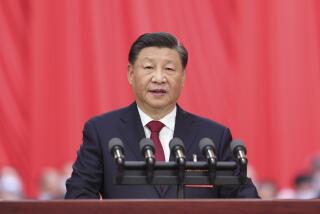Why China can’t recover quickly from the coronavirus outbreak like it did with SARS

BEIJING — Buoyed by Lunar New Year bonuses, Chinese consumers are supposed to be spendthrift this time of year — splurging on gifts, trips to the movies and lavish foreign vacations.
But the spread of a deadly coronavirus in recent days has brought the world’s No. 2 economy to a virtual standstill, raising fears of a serious economic slowdown that could ripple across the globe.
People in China this week could not spend money even if they wanted to at some of the world’s most recognizable retailers. Starbucks closed half of its more than 4,000 stores in China, IKEA closed all its 30 outlets in the country and McDonald’s shuttered several hundred in Hubei province, which includes Wuhan city.
Stock markets in New York, Tokyo and Hong Kong have yet to recover from losses sustained after news last week of China’s lockdown of Wuhan, the city of 11 million where the outbreak started.
“A broader spread of this disease has the potential to disrupt travel, trade and supply chains throughout Asia,” said Eswar Prasad, an economist at Cornell University and the former head of the International Monetary Fund’s China division.
China has been through this before, in 2003, when the deadly SARS epidemic briefly interrupted the country’s hard-charging ascent as an industrial powerhouse.
Back then, consumer spending accounted for only one-fifth of China’s growth, which was much more reliant on factory workers churning out goods for the outside world. Today, with many exporters who had factories in China having fled for cheaper pastures in Southeast Asia, about one-third of China’s economic expansion is powered by consumer spending at home.
While that’s a sign of how much the Chinese economy has developed away from being the world’s factory floor to rely more on its wealthier population, it also means bouncing back from the current outbreak may not be as easy as before. Consumers will hold back spending if the outbreak persists.
Economic analysts say it’s too soon to tell how much a financial shock is in store for China. The virus had infected more than 8,200 people in more than a dozen countries and killed at least 170 in China, as of Thursday.
Economists are predicting losses of a percentage point or more to Chinese growth in the first quarter from a year earlier — no small loss for a country expected to expand this year at its slowest rate since 1990, the aftermath of the bloody Tiananmen Square crackdown.
China’s banking regulator has pledged to help businesses by lowering some interest rates and making it easier to apply for loans. Any major stimulus, however, will have to take into consideration China’s surging debt of more than $40 trillion to fund massive infrastructure projects and prior loans to blunt the effects of the trade war with the United States. Since SARS, China’s ratio of debt-to-gross domestic product, a key gauge, has doubled to more than 300%.
The coronavirus contagion comes just as things had started to look brighter for the Chinese economy with the signing of a Phase 1 deal this month signaling a truce in the costly trade war with the United States.
Now China and the countries that rely on its business are facing uncertainty.
“This disruption comes at a time when Chinese economic growth already looked fragile and will undo some of the boost in consumer and business sentiment from the China-U.S. trade deal,” Prasad said.
Nowhere is that being felt more squarely than in the travel industry, with roughly 40 million people under mandatory quarantine (besides the untold millions under self-imposed quarantine) and the government’s cancellation of domestic and international tour groups.
The drop-off in Chinese tourists this Lunar New Year break — China’s equivalent of Christmas, Thanksgiving, New Year’s and July 4 rolled into one — is being felt from Paris to Phuket, Thailand.
Between Friday and Thursday, the number of Chinese visitors to the gambling mecca of Macao fell more than 80% from a year earlier. Shares of Wynn Resorts plunged 10% and Las Vegas Sands Corp. shrank nearly 5% in that time. MGM Resorts International stock value plummeted more than 6% Monday before rebounding slightly.
Beyond the travel industry, there are fears that China’s factories will take longer to come back online with migrant workers unable to travel. That poses a major risk for multinational companies such as Apple, which produces most of its products in China.
“If the China outbreak becomes more spread it could negatively impact the supply chain, which would be a major investor worry for Apple and other tech companies,” said Daniel Ives, an analyst for Wedbush Securities.
The cities under strict quarantine will also contribute to the slowdown. Wuhan, for example, is the epicenter of China’s auto manufacturing sector. Factories there produce vehicles for General Motors and Honda. The city accounts for 1.6% of China’s economic output.
It’s robust consumer spending, however, that has to rebound quickly to dispel fears of an economic slump.
At an outdoor shopping mall in Beijing’s upscale Sanlitun district Thursday evening, stores such as Chanel, H&M and Adidas were mostly empty.
Only the Apple store drew customers unable to resist trying out gadgets, assisted by clerks in red T-shirts and surgical masks.
This far into the outbreak, hardly anyone in Beijing goes out in public without a mask. With the new year holiday extended and fears of the virus keeping people home, subway trains are nearly empty.
One shopper who lived in Beijing during the SARS epidemic hopes the current outbreak will be similarly short with little long-lasting effects.
“2003 was really devastating, but we recovered,” said the man, 36, who gave only his last name, Tang.
The Chinese government will have to inspire confidence to get people to spend again, analysts say. To that end, China has done a better job than during SARS, they say.
“The crisis response of the Chinese government often follows a predictable pattern from delay and denial initially, to full mobilization, overreaction and then correction to a more sustainable course,” wrote Gavekal Dragonomics analysts Andrew Batson and Ernan Cui in a research note. “The delay-and-denial phase of the response to this coronavirus outbreak has clearly been much shorter than it was during the SARS outbreak of 2003, when officials hid the spread of the virus for months.”
Pierson reported from Singapore and Chang from Beijing.
More to Read
Sign up for Essential California
The most important California stories and recommendations in your inbox every morning.
You may occasionally receive promotional content from the Los Angeles Times.












